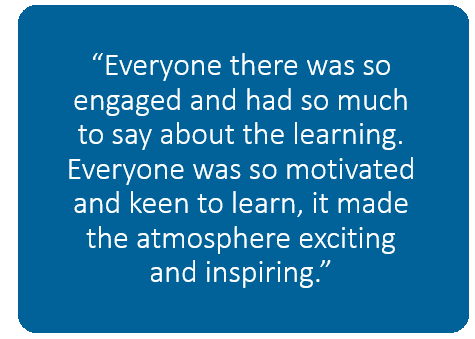Q&A: What’s it like being a UCLPartners Improvement Fellow?
Ruth McDonald is an Enhanced Recovery Nurse for gynaecology & breast patients in the Women’s Health team at University College London Hospital where she has worked for five years. Here Ruth shares her experience of the UCLPartners Improvement Fellows programme which she joined in 2018.
What led you to apply to the Improvement Fellows programme?
I first heard about the Improvement Fellows programme when the divisional director for Women’s Health sent out an email encouraging people to apply.
I’d been working in Quality Improvement (QI) from the word go as my role involves facilitating elective surgery pathways and I use QI methodology to enhance that work. I applied to the programme because I wanted to take this knowledge to the next level and learn how to spread improvement.
Also, before I became involved in the Improvement Fellows programme, there were about eight different specialties in my division, working on the same pathways but working very separately. I decided to set up a cross-trust group to share learning and take the division out of silo working. My hope was that the programme would help make this group more effective and more efficient.
What did you enjoy most about the programme?
I found the masterclasses really enjoyable and stimulating. But the best bits of the course were the break out tasks and coffee breaks because everyone there was so engaged and had so much to say about the learning. Compared to other courses I’ve been on, this was so different. Everyone was so motivated and keen to learn, it made the atmosphere exciting and inspiring.

What do you think the greatest benefits of the programme have been and how has it influenced the way you work?
Being an Improvement Fellow has really increased my confidence in QI. It has brought all my previous learning together, building on what I already knew and taking it that step further. I also felt very encouraged when I was able to share what I already knew with the group. It was nice to be part of a diverse group that could teach each other so much. I’ve worked in acute care for a long time and it’s been so great to get the chance to learn from other sectors such as community mental health practitioners and GPs. I’ve now got contacts for GPs and community care staff so we can plan patient care together.
The programme also increased my confidence to just give things a go! It taught me that ‘perfect’ doesn’t exist and I’ve become much more open to failure and feedback, which I dreaded before. I feel qualified to judge when something is ‘good enough’ to trial and I know that feedback and learning is all part of the improvement process.
How do you hope to use what you have learnt in the future?
During the programme I ran a prehabilitation trial. Prehabilitation is a relatively new concept that has been developed in the past few years. It’s a trimodal programme, engaging patients more in their care to prepare psychologically, physically and nutritionally for surgery. This reduces anxiety, reduces the chance of surgical complications and aids recovery. Patient experience and control over care is key.
I am now in the process of writing a business case to bring this method of preparation into a full two-year trial.
I also set up a multidisciplinary team focused on improvement which includes anaesthetists, clinical psychologists and nurses, and we recently had our first project signed off: getting enhanced recovery education coordinated across the surgery teams. I am really proud of what we’ve achieved so far.

Find out more about the Improvement Fellows programme.